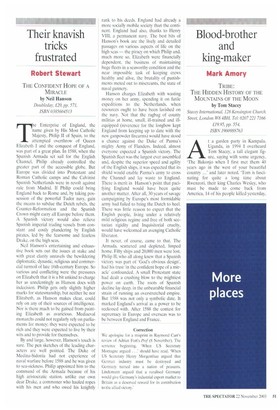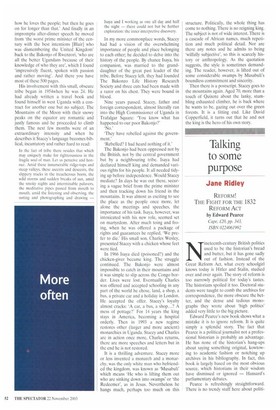Blood-brother and king-maker
Mark Amory
TRIBE: THE HIDDEN HISTORY OF THE MOUNTAINS OF THE MOON by Tom Stacey Stacey International, 128 Kensington Church Street, London W8 4BH, Tel: 0207 221 7166 £19.95, pp. 554, ISBN 1900988763 At a garden party in Kampala, Uganda, in 1994 I overheard Tom Stacey, a tall elegant figure, saying with some urgency, The Bakonjo when I first met them 40 years ago in the west of your beautiful country ...' and later noted, 'Tom is fascinating for quite a long time about Rwenzori, their king Charles Wesley, who must be made to come back from America, 14 of his people killed yesterday.
how he loves the people; but then he goes on for longer than that.' And finally in an impromptu after-dinner speech he moved from 'the worst prime minister of the century with the best intentions [Blair] who was dismembering the United Kingdom' back to the Bakonjo of Rwenzori, 'who are all the better Ugandans because of their knowledge of who they are', which I found 'impressively fluent, spoken with passion and rather moving'. And there you have most of these 500 pages. His involvement with this small, obscure tribe began in 1954when he was 24. He had already written a travel book and found himself in west Uganda with a contract for another one but no subject. The Mountains of the Moon with their snowy peaks on the equator are romantic and justly famous and he proceeded to climb them. The next few months were of an extraordinary intensity and when he describes it Stacey's language becomes biblical, incantatory and rather hard to read:
In the fact of tribe there resides that which may uniquely make for righteousness in the fragile soul of man. Let as perceive and honour. Amid these innumerable ridge-tops and steep valleys, these ascents and descents. the slippery tracks in the treacherous boots, the wild storms and sudden breaks of sun, amid the smoky nights and interminable palavers, the meditative pipes passed from mouth to mouth, amid the listening and observing, the noting and photographing and drawing — Isaya and I working as one all day and half the night — there could not but be further exploration: the inner interpretive discovery.
In my more commonplace words, Stacey had had a vision of the overwhelming importance of people and place belonging to each other; he decided to delve into the history of the people. By chance Isaya, his companion, was married to the granddaughter of the great past leader of the tribe. Before Stacey left, they had founded The Bakonzo Life History Research Society and three cuts had been made with a razor on his chest. They were bound in blood.
Nine years passed. Stacey, father and foreign correspondent, almost literally ran into the High Commissioner of Uganda in Trafalgar Square: 'You know what has happened to our poor Bakonjo?' 'No.'
'They have rebelled against the government.'
'Rebelled? I had heard nothing of it.' The Bakonjo had been oppressed not by the British, not by the central government but by a neighbouring tribe. Isaya had declared himself king and demanded various rights for his people. It all needed tidying up before independence. Would Stacey mediate? In days he was out there, securing a vague brief from the prime minister and then tracking down his friend in the mountains. It was almost as exciting to see the place as the people once more, let alone the meetings and speeches, the importance of his task. Isaya, however, was intoxicated with his new role, seemed set on martyrdom. After much toing and froing, when he was offered a package of rights and guarantees he replied, 'We prefer to die.' His small son, Charles Wesley, presented Stacey with a chicken whose feet were tied.
In 1966 Isaya died (poisoned?) and the chicken-giver became king. The struggle continued. The Bakonjo were almost impossible to catch in their mountains and it was simple to slip across the Congo border. Lives were lost. Eventually Charles was offered and accepted schooling in any part of the world he chose, land, a shop, a bus, a private car and a holiday in London. He accepted the offer. Stacey's loyalty almost cracks: 'A car, a bus, a shop...? A mess of pottage?' For 14 years the king stays in America, becoming a hospital orderly. Then in 1993 a new regime restores other (larger and more ancient) monarchies in Uganda. Stacey and Charles are in action once more, Charles returns, there are more speeches and letters but in the end he is not restored.
It is a thrilling adventure. Stacey more or less invented a monarch and a monarchy, was the only white man who befriended the kingdom, was known as `Musabuli' which means 'He who is lifting them out who are sinking down into swamps' or 'the Redeemer', as in Jesus. Nevertheless he hangs much, perhaps too much on this structure. Politically, the whole thing has come to nothing. There is no reigning king. The subject is not of wide interest. There is a cascade of African names, much repetition and much political detail. Nor are there any notes and he admits to being 'wilfully subjective', so this is scarcely history or anthropology. As the quotation suggests, the style is sometimes demanding. The reader, however, is lifted out of some considerable swamps by Musabuli's boundless commitment and sincerity. Then there is a postscript. Stacey goes to the mountains again. Aged 70, more than a touch of Quixote about the lanky, stumbling exhausted climber, he is back where he wants to be, gazing out over the green forests. It is a fitting end. Like David Copperfield, it turns out that he and not the king is the hero of his own story.



























































































 Previous page
Previous page